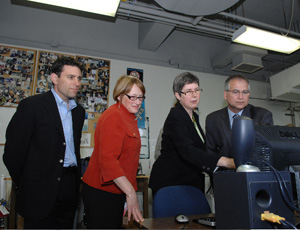 |
| Mary Anne White (second from right) takes the podium party on a tour of her lab. L-R: Graham Gagnon, Suzanne Fortier, Dr. White, Gary Goodyear (Danny Abriel photo) |
Dalhousie’s research excellence in two growing fields – energy production and water safety – was recognized Friday with a significant investment from the Natural Sciences and Engineering Research Council of Canada (NSERC) that will boost opportunities for grad students and post-docs.
Two research programs will share more than $3 million in funding over the next six years through the CREATE program (Collaborative Research and Training Excellence). Gary Goodyear, minister of state for science and technology, made the funding announcement at Dal with Suzanne Fortier, president of NSERC.
“Canada’s future prosperity and growth depends on our support for research today and our support of young people as they take up new careers in research,” said Minister Goodyear.
Grants through the CREATE program are intended to directly support science students and postdoctoral fellows, with the remaining funds going to the development and maintenance of research programs. Dalhousie’s two projects account for 20 per cent of national CREATE funding this round.
“I think in a few words, the goal of the program is to train the workforce of tomorrow,” said Dr. Fortier. “The people that we will need in our country have not only a deep knowledge of their own area of expertise, but also have the skills they need to be innovation-ready.”
Mary Anne White is the lead of DREAMS (Dalhousie Research in Energy, Advanced Materials and Sustainability), one of the programs to receive CREATE funding. Her team will focus on the interwoven elements of energy production, energy storage and sustainability – areas where Dalhousie is already a world leader.
“The CREATE – DREAMS program will take that a step further,” said Dr. White. “(This will) include many aspects of energy production and storage, from the next generation of lithium-ion batteries, beyond lithium-ion batteries, and energy storage materials such as super capacitors and heat storage materials to the sustainable production of environmentally-acceptable or sustainable materials.”
The second Dalhousie program to receive CREATE funding is Systems Training and Education in Water Assets Research and Development (STEWARD), led by Graham Gagnon. The program will train professions in Canada’s water industry, an area of growing importance.
“The STEWARD program … will train researchers both here and at Queens University to address infrastructure and distribution problems and delivery of safe water,” said Martha Crago, Dalhousie’s vice-president research, speaking to Dr. Gagnon’s project.
Priority funding areas for the CREATE program – which was launched in 2008 – are environmental science and technologies; health and related life sciences and technologies; information and communications technologies; and natural resources and energy.
